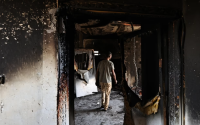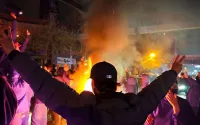Ed Vulliamy in New York, Jason Burke in Peshawar and Paul HarrisThe Observer, 9 December, 2001American forces have already flown surveillance flights over Somalia looking for al-Qaeda forces to target in the next stage of the global war on terror, The Observer has learnt.
Navy pilots have flown waves of missions to map two al-Qaeda camps near the Kenyan border with a view to launching air strikes, Pentagon sources said. US warships have positioned themselves off the coast near the capital, Mogadishu, to stop Osama bin Laden from hiding there, and to prepare for an attack if necessary.
Sensitivity over the killing of 18 Army Rangers in Somalia in 1993 is being overcome by the new, emboldened Pentagon which wants to 'exorcise that ghost', said a source.
The flights have intensified over the past few days. Relief workers in Somalia are reported by the State Department to be bracing for action, and the Kenyan government has said it fears a flood of refugees.
Walter Kansteiner, the US Assistant Secretary for African Affairs, has warned that Somalia's lack of central government could attract terrorists. He said the US had 'strong suspicions' of connections to al-Qaeda among individuals in Mogadishustruggling to establish some kind of authority. The US has named Somalia's al-Itihaad Islamic group on its list of targeted terrorist organisations.
The Somalia move is the most forthright action in a steady widening of the war on terror. The hunt for fresh targets in pursuing the al-Qaeda terrorist network and its leader, Osama bin Laden, has now spread to Africa, South America and the Balkans.
In Sudan, where bin Laden lived from 1991 to 1996, America is putting additional pressure on the regime to share information on al-Qaeda's potential bases there.
Pentagon and White House officials are also at work in Yemen, threatening the government that it must destroy al-Qaeda camps believed to remain in the northern mountains. The pressure has intensified after revelations that the Yemeni regime detained one of the bombers of the USS Cole, only to release him 17 months before the attack. The US has sent teams to Yemen for an assault on al-Qaeda's bases.
The CIA and military intelligence is also sending missions into Paraguay and Uruguay to combat what it believes are active al-Qaeda cells. Some of these are concentrated, say officials, at the point where Brazil, Argentina and Paraguay meet near the Foz do Iguaçu waterfall.
Another dispatch has been sent to Bosnia, where al-Qaeda bases are said to be established in the otherwise secular Muslim community. The Muslim component of the fractured Sarajevo government has been warned that the Nato peacekeeping force in the country could be turned on al-Qaeda at any moment.
Meanwhile, Afghanistan's new leader, Hamid Karzai, has called upon Afghans to help hunt down bin Laden and Taleban leader Mullah Mohamed Omar, both of whose whereabouts are still shrouded in mystery.
Speculation has intensified over the location of the pair after a cave complex believed to be bin Laden's main base was seized and Mullah Omar's stronghold of Kandahar fell on Friday. A contingent of 1,000 more US Marines is poised to join the hunt for bin Laden, according to reports reaching The Observer.
It emerged yesterday that British troops could lead a peacekeeping force for Afghanistan, US Secretary of State Colin Powell said. Speaking during a visit to Central Asia, Powell said the international force would go into Afghanistan soon after the interim government takes office on 22 December. Powell is expected to visit Britain on Tuesday for discussions that will finalise details. A Ministry of Defence spokesman confirmed Britain was ready to make 'a significant contribution' to any force.
The Observer can reveal that dozens of senior al-Qaeda and Taliban officials have escaped Afghanistan and are living in Pakistani tribal areas near the border.Some of the exiled Taliban figures have already called for assistance in continuing a jihad against America. Last week the brother of a Pakistani al-Qaeda commander addressed tribesmen in Pakistan's remote Tirah valley.
The exiles include Maulvi Abdul Kabir, the Taliban's Deputy Prime Minister, who has moved into a house in Peshawar. Others include the hardline head of the supreme court, Maulvi Mohamed Saqib, Information Minister Qadratullah Jamal, Deputy Foreign Minister Abdul Rahman Zahed, and Hamdullah Nomani, the Mayor of Kabul.






